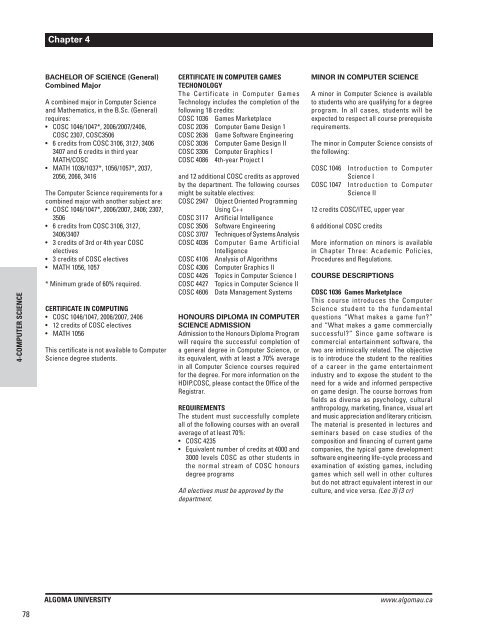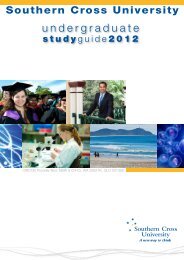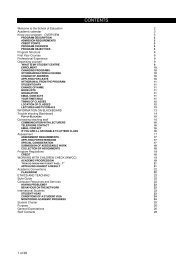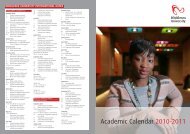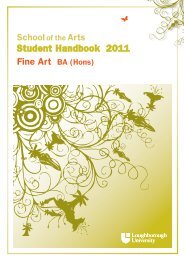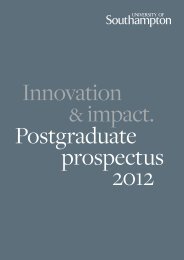You also want an ePaper? Increase the reach of your titles
YUMPU automatically turns print PDFs into web optimized ePapers that Google loves.
Chapter 4<br />
4-COMPUTER SCIENCE<br />
BACHELOR OF SCIENCE (General)<br />
Combined Major<br />
A combined major in Computer Science<br />
and Mathematics, in the B.Sc. (General)<br />
requires:<br />
• COSC 1046/1047*, 2006/2007/2406,<br />
COSC 2307, COSC3506<br />
• 6 credits from COSC 3106, 3127, 3406<br />
3407 and 6 credits in third year<br />
MATH/COSC<br />
• MATH 1036/1037*, 1056/1057*, 2037,<br />
2056, 2066, 3416<br />
The Computer Science requirements for a<br />
combined major with another subject are:<br />
• COSC 1046/1047*, 2006/2007, 2406; 2307,<br />
3506<br />
• 6 credits from COSC 3106, 3127,<br />
3406/3407<br />
• 3 credits of 3rd or 4th year COSC<br />
electives<br />
• 3 credits of COSC electives<br />
• MATH 1056, 1057<br />
* Minimum grade of 60% required.<br />
CERTIFICATE IN COMPUTING<br />
• COSC 1046/1047, 2006/2007, 2406<br />
• 12 credits of COSC electives<br />
• MATH 1056<br />
This certificate is not available to Computer<br />
Science degree students.<br />
CERTIFICATE IN COMPUTER GAMES<br />
TECHONOLOGY<br />
The Certificate in Computer Games<br />
Technology includes the completion of the<br />
following 18 credits:<br />
COSC 1036 Games Marketplace<br />
COSC 2036 Computer Game Design 1<br />
COSC 2636 Game Software Engineering<br />
COSC 3036 Computer Game Design II<br />
COSC 3306 Computer Graphics I<br />
COSC 4086 4th-year Project I<br />
and 12 additional COSC credits as approved<br />
by the department. The following courses<br />
might be suitable electives:<br />
COSC 2947 Object Oriented Programming<br />
Using C++<br />
COSC 3117 Artificial Intelligence<br />
COSC 3506 Software Engineering<br />
COSC 3707 Techniques of Systems Analysis<br />
COSC 4036 Computer Game Artificial<br />
Intelligence<br />
COSC 4106 Analysis of Algorithms<br />
COSC 4306 Computer Graphics II<br />
COSC 4426 Topics in Computer Science I<br />
COSC 4427 Topics in Computer Science II<br />
COSC 4606 Data Management Systems<br />
HONOURS DIPLOMA IN COMPUTER<br />
SCIENCE ADMISSION<br />
Admission to the Honours Diploma Program<br />
will require the successful completion of<br />
a general degree in Computer Science, or<br />
its equivalent, with at least a 70% average<br />
in all Computer Science courses required<br />
for the degree. For more information on the<br />
HDIP.COSC, please contact the Office of the<br />
Registrar.<br />
REQUIREMENTS<br />
The student must successfully complete<br />
all of the following courses with an overall<br />
average of at least 70%:<br />
• COSC 4235<br />
• Equivalent number of credits at 4000 and<br />
3000 levels COSC as other students in<br />
the normal stream of COSC honours<br />
degree programs<br />
All electives must be approved by the<br />
department.<br />
MINOR IN COMPUTER SCIENCE<br />
A minor in Computer Science is available<br />
to students who are qualifying for a degree<br />
program. In all cases, students will be<br />
expected to respect all course prerequisite<br />
requirements.<br />
The minor in Computer Science consists of<br />
the following:<br />
COSC 1046 Introduction to Computer<br />
Science I<br />
COSC 1047 Introduction to Computer<br />
Science II<br />
12 credits COSC/ITEC, upper year<br />
6 additional COSC credits<br />
More information on minors is available<br />
in Chapter Three: <strong>Academic</strong> Policies,<br />
Procedures and Regulations.<br />
COURSE DESCRIPTIONS<br />
COSC 1036 Games Marketplace<br />
This course introduces the Computer<br />
Science student to the fundamental<br />
questions “What makes a game fun?”<br />
and “What makes a game commercially<br />
successful?” Since game software is<br />
commercial entertainment software, the<br />
two are intrinsically related. The objective<br />
is to introduce the student to the realities<br />
of a career in the game entertainment<br />
industry and to expose the student to the<br />
need for a wide and informed perspective<br />
on game design. The course borrows from<br />
fields as diverse as psychology, cultural<br />
anthropology, marketing, finance, visual art<br />
and music appreciation and literary criticism.<br />
The material is presented in lectures and<br />
seminars based on case studies of the<br />
composition and financing of current game<br />
companies, the typical game development<br />
software engineering life-cycle process and<br />
examination of existing games, including<br />
games which sell well in other cultures<br />
but do not attract equivalent interest in our<br />
culture, and vice versa. (Lec 3) (3 cr)<br />
ALGOMA UNIVERSITY<br />
www.algomau.ca<br />
78


